by S. Schneidmann
Opponents of the rapprochement with Iran pointed to its military interference in the civil wars in Arab countries, and argued that the hands of Soleimani, a murderer and war criminal, were stained with the blood of many Arabs and Muslims.
On December 11, 2017, Iranian media and media affiliated with the resistance axis reported that Gen. Qassem Soleimani, commander of Iran's Islamic Revolutionary Guards Corps' Qods (Jerusalem) Force, had spoken on the phone with commanders of the military wings of both Hamas and Palestinian Islamic Jihad, telling them that all the resistance movements in the region were ready to defend Al-Aqsa mosque.[1] Two days later, the Kuwaiti Al-Jarida newspaper, which is known for its anti-Iran positions, reported that in the conversation Soleimani had asked the Hamas and Islamic Jihad military leaders to recruit activists in the West Bank, and had promised to provide the organizations with weapons so that they could launch armed activity against Israel from there. According to the report, Soleimani said that Iranian Supreme Leader Ali Khamenei was giving top priority to this struggle, and that U.S. President Donald Trump's declaration of Jerusalem as the capital of Israel had prepared the ground for the resistance struggle against Israel.[2]
In a December 25, 2017 speech in Gaza, Hamas Gaza political bureau head Yahya Al-Sinwar said that Soleimani had "contacted [Hamas's 'Izz Al-Din] Al-Qassam [Brigades] and [Islamic Jihad's] Al-Quds Brigades" and stressed that "Iran, the IRGC, and [its] Qods Force stand, with all their capabilities, alongside our people, in defense of Jerusalem, and in order to keep Jerusalem the capital of the State of Palestine." Al-Sinwar added that Soleimani had "said clearly: We place all our capabilities at your disposal in the battle for the defense of Jerusalem. He did not ask, set conditions, or encourage us to employ any specific type of resistance."
To view Yahya Al-Sinwar's December 25, 2017 statements on MEMRI TV, click here or below:
Al-Sinwar's statements reflect the policy of the new Hamas leadership, elected in the first half of 2017, that strives to rehabilitate and rebuild relations with Iran after they were undermined because of divergent positions in the Syria crisis.[3]
Apparently, however, journalists and activists known to be Hamas sympathizers and affiliates are sharply divided over this new direction and over Al-Sinwar's fulsome praise for Soleimani, with arguments among Hamas supporters on social media and in online newspapers. Opponents of the rapprochement with Iran pointed to its military interference in the civil wars in Arab countries, and argued that the hands of Soleimani, a murderer and war criminal, were stained with the blood of many Arabs and Muslims. Likewise, they questioned the leadership capabilities and political judgment of Al-Sinwar because he favors this rapprochement.
In contrast, supporters of the rapprochement with Iran and the IRGC argued that Iran and Hamas had shared interests, and that Iran had proven itself during hard times as the Palestinians' best supporter and friend, providing weapons and support, and that it could be relied on – particularly since the Arab countries had turned their backs on Hamas and it needed allies. Some also stressed that the existence of a Hamas-Iran relationship did not necessarily mean that Hamas supported Iran's policy in the region.
This report will present the dispute that emerged on social media and in online newspapers following Al-Sinwar's announcement that Iran and the IRGC support Hamas.
The Dispute On Social Media Opponents Of Hamas-Iran Relations: It Interferes In Other Countries' Civil Wars; Soleimani Is A War Criminal
On December 26, 2017, the day after Al-Sinwar's speech, Dr. Ibrahim Hamami, a Palestinian journalist residing in London who has previously published articles on Hamas-affiliated websites, tweeted in response to Al-Sinwar's statements: "Does Mr. Al-Sinwar, who claims that Soleimani loves Palestine, know how many Muslims and Arabs this criminal has murdered since 2012 in Syria, Iraq, Yemen, and Lebanon? Palestine will never be liberated by people like the criminal Soleimani. We say: Palestine loathes, hates, and curses Soleimani, and may we earn the right to see Allah do justice unto him. [Oh Al-Sinwar], if only you would shut up!"[4]
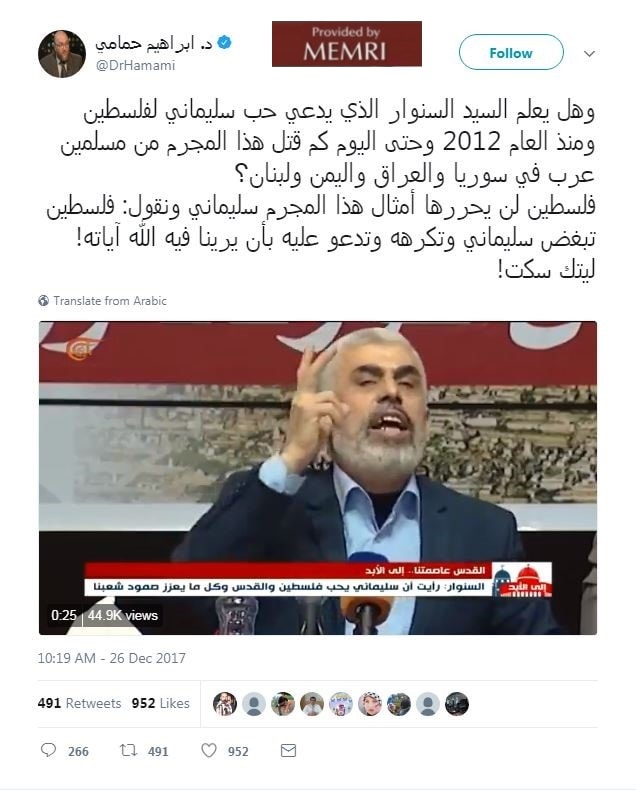
Hamami: "Palestine loathes, hates, and curses Soleimani" (Twitter.com/DrHamami, December 26, 2017)
Jordan-based Palestinian journalist Yasser Al-Za'atreh, who is close to the Muslim Brotherhood and was once editor of the Hamas mouthpiece Filastin Al-Muslima, tweeted: "Al-Sinwar's praise for Soleimani has angered most of the [Arab] ummah. [Soleimani] is a criminal, and [even] if he liberates Jerusalem it will not suffice to cleanse his hands that are stained with the blood of the Syrians. This is in addition to his crimes in Iraq and Yemen, and to his well-known sectarian [Shi'ite] fantasies. Thus, this miserable [praise for Soleimani] must stop, in order [for Al-Sinwar] to preserve [his] credibility."[5]
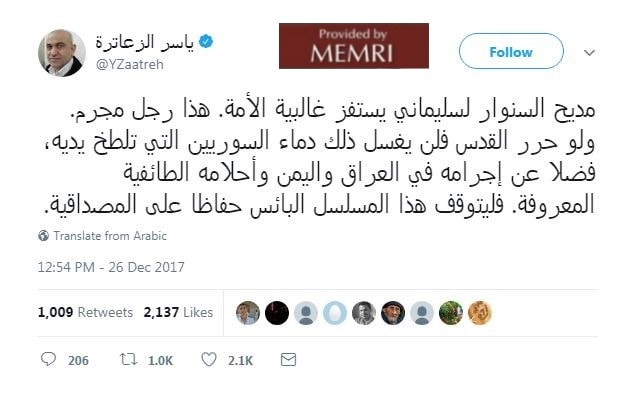
Al-Za'atreh: "[Even if Soleimani] liberates Jerusalem it will not suffice to cleanse his hands that are stained with the blood of the Syrians" (Twitter.com/YZaatreh, December 26, 2017)
Pro-Hamas Al-Jazeera correspondent Majed 'Abd Al-Hadi tweeted: "What does it help Yahya Al-Sinwar if he wins [the sympathy of] Qassem Soleimani but loses himself? How does he dare to purify the Iranian hands that are stained with the blood of the Syrians and the Iraqis without fearing that [by doing so he] will stain himself, and Hamas as well?"[6] He also tweeted a survey asking readers: "What is your position on the controversial statements by Hamas Gaza leader Yahya Al-Sinwar about Qassem Soleimani's love for Jerusalem and Iran's support for the Palestinian resistance?" Of the respondents, 43% replied that this was "deviation from the principles of the resistance"; 39% called it "[a position] forced by the pressure of the siege [on Gaza]"; 10% called them "a recognition in principle of the de facto situation," and 8% expressed other views.[7]
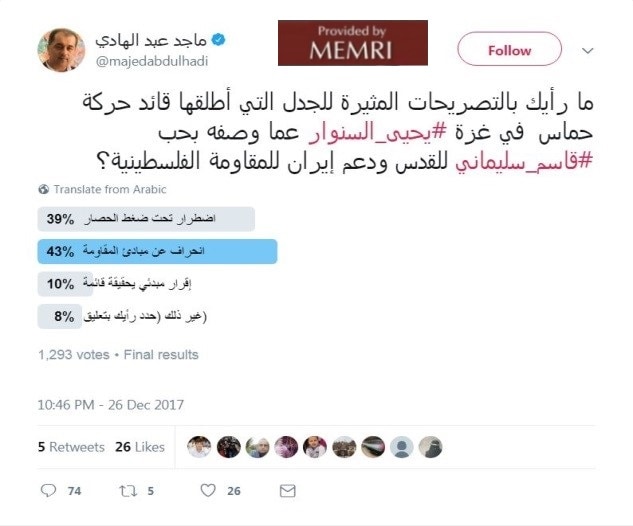
Responses to Majed 'Abd Al-Hadi's survey (Twitter.com/majedabdulhadi, December 26, 2017)
The Palestinian author Mukhlis Barzaq, who resides in Istanbul and has published articles on Hamas-affiliated websites, shared on his Facebook page a May 2016 tweet by Sheikh Raed Salah, leader of the northern branch of the Islamic movement in Israel, criticizing Soleimani. Salah wrote: "I declare Jerusalem's renunciation [of the IRGC Qods Force]: From my [cell] in Ramon Prison in the desert [in Israel], near Nafha Prison, I hereby declare the blessed Jerusalem's renunciation of the military Iranian Qods Force which continues to slaughter our men in Syria, particularly in Aleppo, and I stress, in the name of the blessed Jerusalem, that the name of Jerusalem is too transcendent for criminals such as those of the Qods Force to save it in order to legitimize their crimes."[8]
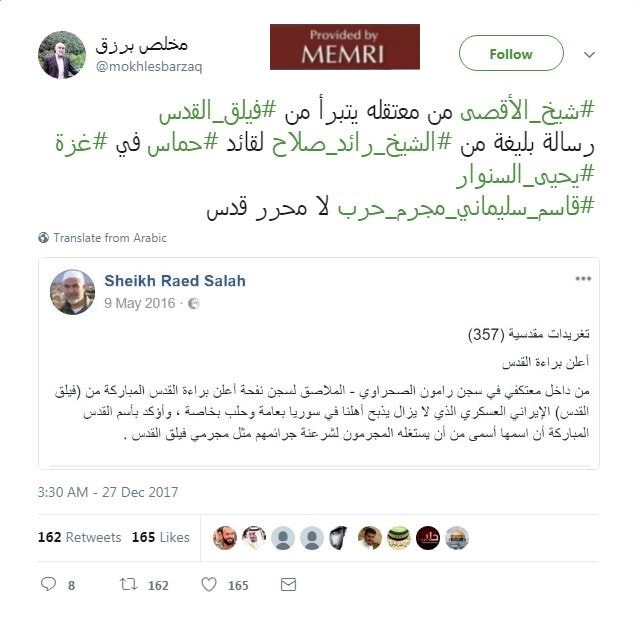
Mukhlis Barzaq's tweet of Facebook post by Sheikh Raed Salah. "The name of Jerusalem is too transcendent for criminals such as those of the Qods Force to save it in order to legitimize their crimes" (Twitter.com/mokhlesbarzaq, December 27, 2017; Facebook.com/AlSHeikhRaedSalah, May 9, 2016)
Supporters Of Hamas-Iran Relations: We Have Shared Interests; The Arab Countries Have Abandoned Hamas
Others hastened to defend Al-Sinwar and Hamas's relations with Iran and with Soleimani. They stressed that the Hamas-Iran alliance was based on shared interests, and that this did not mean that Hamas supported Iran's policy in the region or its interference in the civil wars in Arab countries.
For example, in response to a tweet by Syrian journalist Omar Madaniah stating "Hamas leader Yahya Al-Sinwar thinks that the massacres of Syrians, Iraqis, and Yemenis carried out by the IRGC, the Qods Force, and Qassem Soleimani were aimed only at helping Palestine!,"[9] Adham Abu Salmiya, spokesman for the National Committee for Breaking the Siege on Gaza, tweeted: "These [statements] are shameful lies. [They are] counterfeit and a distortion of clear statements by the brother Yahya Al-Sinwar. [It is] the height of ignobility to deceive the people about remarks that were documented in audio and video [recordings]. 'Abu Ibrahim' [Al-Sinwar] spoke of establishing ties between Soleimani and the commanders of the Al-Qassam [Brigades] and the [PIJ] Al-Quds Brigades, and confirmed this. It is neither smart nor reasonable for the resistance to refuse any support whatsoever."[10]
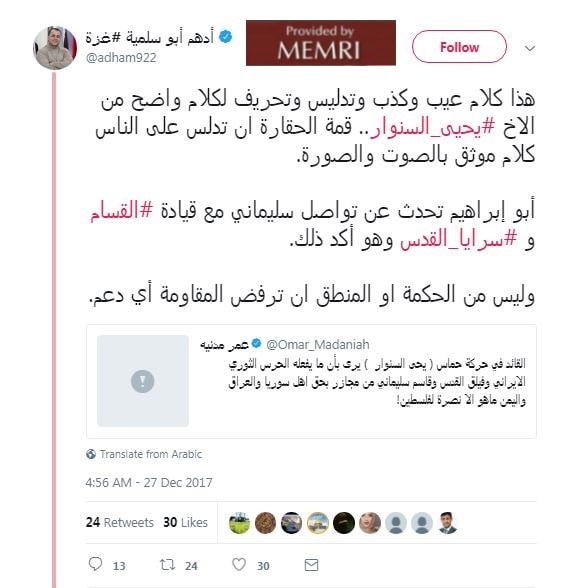
Abu Salmiya's response to Omar Madaniah's tweet: "It is neither smart nor reasonable for the resistance to refuse any support whatsoever" (Source: Twitter.com/adham922, December 27, 2018)
Muhammad Al-Madhoun, who served as Hamas prime minister Isma'il Haniya's office director, responded to a tweet by Saudi researcher and oppositionist Dr. Kassab Al-'Otaibi that stated: "Hamas leader Yahya Al-Sinwar lauds the terrorist Qassem Soleimani after all his massacres in Syria and Iraq. In Gaza, they burned the Saudi flag and pictures of King Salman and his Crown Prince, cursed us, and accused us of selling Jerusalem – and today they praise Iran and purify [the image of] the child murderer and rapist Soleimani! This is loathsome, opportunistic Zionist behavior!"[11] Al-Madhoun wrote: "The author of this tweet took advantage of a political announcement by Hamas Gaza leader Yahya Al-Sinwar in order to spread his hostility and hatred to our Palestinian people, using the terms 'burned,' 'accused,' 'hated,' 'praised'... Oh my brother, morning and night, we are exposed to millions of curses from your country [Saudi Arabia]... Why do you use this inciting discourse?"[12]

Muhammad Al-Madhoun: "Oh my brother, morning and night, we are exposed to millions of curses from your country... Why do you use this inciting discourse?" (Twitter.com/mohamed_mdn, December 27, 2017.)
Hamas-affiliated journalist Ibrahim Al-Madhoun, who writes for the Hamas organ Al-Risala, tweeted a survey question asking "Are you happy with Hamas-Iran relations, and what is your position on them?" Of the respondents, 55% answered "I agree and see this as natural"; 30% answered "I do not agree and I demand a stop to them "; and 15% answered, "I don't know."[13]
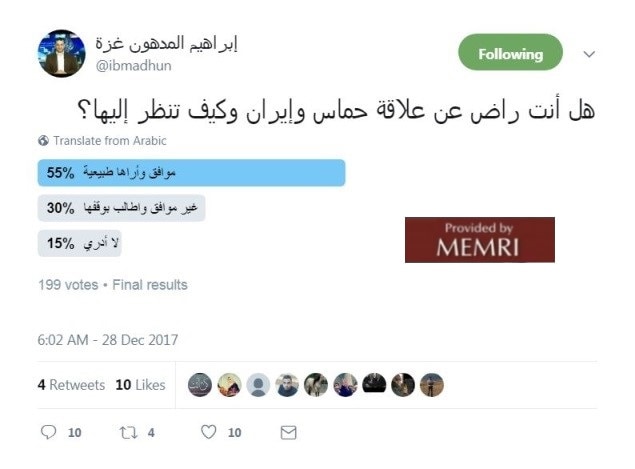
Ibrahim Al-Madhoun's survey question; the majority of respondents support Hamas-Iran relations. (Source: Twitter.com/ibmadhun, December 28, 2017)
Similarly, in a series of tweets, Al-Madhoun justified the Hamas-Iran partnership as based on shared interests alone, without Hamas support for Iran's policy in the region, and stressed that Hamas had turned to Iran after the Arab countries had turned their back on it. In a series of December 27 tweets, he said: "When any force supports you with funds and weapons, in light of the world's turning its back and besieging you, the least you can do is welcome it and express appreciation for its position towards you – and this doesn't mean showing hostility towards anyone else. Hamas is entitled to express esteem for Iran's position, and for Gen. Qassem Soleimani. Unfortunately, the domestic troubles of Arab countries have led them to perdition, because of their positions alongside the U.S. and their reliance on it. I disagree with, and am critical of, many Hamas's policies, but I think that its position with regard to Iran at this difficult time is quite correct, since Iran has proven itself in hard times as its best friend and support, and that it can be relied on, while many elements sold us to the U.S. and other elements renounced us. The praise for Qassem Soleimani does not mean that we approve of his policy in [our] burning region, since it has drawn the blood of the [Arab] ummah and exhausted it. What interests us today is how to fight the [Israeli] occupation, which is the real cancer, and whose elimination will bring stability to Syria, Libya, Yemen, and Iraq."
The following day, Al-Madhoun tweeted: "Hamas is a political movement, not a charity organization. What Al-Sinwar said about Qassem Soleimani was neither praise nor condemnation. He conveyed the content of the conversation and [information about] the relations [with him] and answered questions.
"Hostility towards Iran does not serve the interests of the Islamic revolutionary movements. The Arabs have attempted to rely on the U.S. and on the oil states[14] [in the Middle East] and the result has been the loss of Iraq, Syria, Libya, and Yemen, and, before that, Palestine. Even Turkey has now changed its strategy, improved its relations with Iran and Russia, and closed the book on the bloody chapter in Syria. As a country pursuing its own interests, Iran makes mistakes, but does anyone in the region not make mistakes? Iran's only advantage versus the regimes in the region at the moment is its willingness to support our people and our resistance with funds and weapons, without fearing the U.S. – while our rivals, to their disgrace, are stepping up their siege against us, fighting us, isolating us, and refusing to recognize our rights, and are normalizing with Israel and marching rapidly towards it."[15]
The Dispute In Online Newspapers
A similar dispute was underway among Hamas-affiliated and pro-Hamas journalists in online newspapers.
Palestinian Writer: The Relationship With Iran Will Benefit Hamas, But It Must Be Conducted Out Of The Spotlight
In an article criticizing the open nature of Al-Sinwar's and Hamas's relations with Soleimani and with Iran, Palestinian journalist Saleh Al-Na'ami, who also writes on Hamas-affiliated websites, said that Al-Sinwar should learn from the Houthis in Yemen whose relations with Iran were conducted more discreetly. He stated: "Yahya Al-Sinwar, the Hamas Gaza leader, has on multiple occasions heaped praise upon Iran, praised its position in the Palestinian issue, and emphasized its support for his movement. No one disagrees with Hamas's right to build its regional alliances in a way that serves its needs – particularly in light of the conspiring on the part of some Arab countries against the Palestinian national cause. But the problem is that Al-Sinwar's speech further restricts Hamas's already minimal room to maneuver in the domestic [Palestinian], regional and international levels, because of his courting of Iran... and his fulsome praise for IRGC [Qods Force] commander Qassem Soleimani.
"The discourse used by Al-Sinwar towards Iran could provide domestic, regional, and international forces sowing evil against Hamas and the Palestinian resistance with pretexts to justify their conspiring against the Palestinian cause and their hostility towards Hamas. On the domestic level, it will give Israel a pretext to claim that every government to arise after the [Hamas-Fatah] reconciliation will be a 'terrorist' government, since it will be allied with a state that violates global norms [i.e. Iran]. Likewise, Al-Sinwar's courting of Iran will allow the Zionists to create an international and regional atmosphere for justifying military activity against Gaza.
"It is unbecoming for the position and strength of the leader of a movement such as Hamas to be seen as one who serves the Iranian propaganda machine by heaping praise upon Qassem Soleimani in this way... Al-Sinwar should learn from the Houthis how to approach regional strategic alliances. Although it is clear to everyone that Iran is the Houthis' main helper in [terms of] arms, advanced technology and training, let alone diplomatic assistance, the Houthis insist on claiming that Iran is unconnected to their war efforts, and Iran claims the same. The Houthis insist on denying [the Iranian assistance] because they understand the need to ease the diplomatic, strategic and propaganda pressure they could incur due to their alliance with Iran and to minimize, as far as possible, Saudi Arabia's ability to create a sympathetic international atmosphere for an attack upon them."[16]
Jordanian Journalist: Al-Sinwar Is Behaving Like An Adolescent, Forging An Alliance With Murderers Of Muslims
Jordanian journalist Luqman Iskandar, whose articles have been cited in Hamas-affiliated websites, posted a scathing article on the Jordanian website Ammonnews titled "Al-Sinwar: A Danger to the Hamas Movement," in which he slammed Al-Sinwar and opposed any sympathy towards Soleimani. Iskandar wrote:
"The comment that... Yahya Al-Sinwar is behaving like an adolescent in his diplomatic conduct and is pushing Hamas to a dark place, from which even the martyrs' blood will not save him, [accurately captures] the general feeling among the movement's supporters. [Hamas] still relies on the spirit of martyrdom for the sake of Allah, but martyrs do not engage in flattery, they fight and are killed. Let us agree that the Palestinians' blood is no holier than the Syrians'. We do not rely on the help of the murderers of Syrians in our action against the murderers of Palestinians. According to our ideology, in whose defense Hamas martyrs are killed, a Muslim does not forge an alliance with the murderers of Muslims to overcome other murderers. Distinguishing between [primary and secondary] enemies is one thing, but forging an alliance with the enemy and courting him is another… [But] the worst thing Al-Sinwar is doing is [inflicting] damage on the nation's consciousness and intensifying internal division. From what lair has this person emerged to court the murderer of our children? If this is how matters stand, why not go all the way and forge an alliance with Donald Trump, because there is no big difference between the American murderer and the Iranian murderer, aside from [skin] color... Don't the supporters of an alliance between Hamas and Iran present the same justifications as the supporters of an alliance with the U.S., saying that it is a matter of necessity? Don't we hear the [exact] same justification from the America-loving wimps?
"The excuses offered by some of the people defending Al-Sinwar, namely that Hamas has not found an Arab or Islamic savior or supporter as an alternative to Iran, do not explain the intensity of Al-Sinwar's courtship of the IRGC Qods Force commander, Gen. Qassem Soleimani. The courtship of Soleimani, and of Iranians in general, is shameful. The information coming out of the [Hamas] movement and the Muslim Brotherhood stream, of which it [Hamas] is a part, confirms that Al-Sinwar is acting like a teenager and is pushing the movement to the abyss... The Hamas of Al-Sinwar is not the Hamas of [the movement's founder,] Ahmad Yassin. Eating pork when you have no choice is one thing, but spicing it and pouring wine over it to relish the meal is something else. Al-Sinwar enjoys being coerced, and this clashes with the first part of the ideology that Hamas martyrs die for."[17]
Pro-Iran Journalist: Iran Is Deeply Committed To The Palestinian Cause
In contrast, the Palestinian journalist Mustafa Abu Al-Sa'ud, whose articles are published in Hamas-affiliated sites, defended the movement's relations with Iran and emphasized that Hamas has every right to receive aid from Iran and cooperate with it areas where their interests overlap, especially since the Arab countries have turned their backs on Hamas.
He wrote: "The Hamas movement is a national liberation movement that strives to strengthen its ties with everyone: with all Arabs and Muslims and with the entire human race. This, in order to reshape the [perception of] the Palestinian cause and clarify that Palestine is a country of religious importance, [and also in order to show that Hamas] knocks on every door, seeking support and aid, without posing any precondition to any of its supporters. Some countries have been generous towards it [Hamas] and provided it with all its needs, especially in the military domain, where Iran has played a major role, as many senior officials in Hamas and Iran have emphasized. Hamas' relations with Iran have had their ups and downs. Due to disputes on various matters, there was [recently] a decline in the relations, but they were never severed. The Arab regimes did not rush [to fill the vacuum created by] the decline in Hamas-Iran relations, in order to help Hamas themselves, but continued to deprive it and slander it with most despicable descriptions – with the exception of Turkey and Qatar,[18] who played an important role in supporting Hamas on the diplomatic, financial, humanitarian and media levels. Qatar thus became the headquarters of the Hamas leadership, and Turkey became a refuge for the oppressed, similar to Al-Habash in the era of the Prophet Muhammad.[19]
"Today, following international and regional changes, Hamas-Iran relations have begun to improve, as evident from several visits by high-level Hamas delegations in Iran, and from Iran's readiness to support Hamas in everything, as a senior Iranian official stated: 'Any support that Hamas requests, it will receive, because we view it as part of the resistance.'[20] And Hamas's leader in Gaza, Yahya Al-Sinwar, spoke in a similar vein, praising Qods Force commander Gen. Qassem Soleimani and describing him as a longtime lover of Palestine who is prepared to provide direct military aid to Jerusalem in order to rescue it from the plans to Judaize it.
"These comments, and this rapprochement [between Hamas and Iran], angered the Arab regimes – especially as some of them believed that Egypt's smiles and openness towards Hamas, alongside its vigorous involvement in the Palestinian reconciliation plan, could tie Hamas' hands and make it dependent upon Egyptian policy, [and] dictate whom [Hamas] will hate and whom it will love, thus distancing it from its allies and friends and preventing it from forging new ties.
"Some believe that Yahya Al-Sinwar's comments may have been ill-timed. But the question [that should be] asked... is: Why shouldn't Hamas draw closer to country interested in supporting the resistance unconditionally, and meet [this country] half way, when the Palestinian and other Arab entities are allowed to draw closer to, identify with and express total agreement with the U.S. and Israel's philosophy that kills, destroys and changes the characteristics of Palestinian history and geography...? I find no justification for the anger and resentment over the rapprochement between Hamas and Iran, especially on the part of Arab regimes, who not only refrained from aiding Hamas and left it on its own to find supporters, but shut the doors to it, viewed it as a terrorist organization, defined it as criminal, and prohibited secret or public expression of sympathy towards it."[21]
* S. Schneidmann is a research fellow at MEMRI.
[1] Tasnim (Iran), December 11, 2017; Almayadeen.net. December 11, 2017.
[2] See MEMRI See MEMRI Inquiry & Analysis No. 1366, Intensive Discussions In Resistance Axis Ahead Of Possible Joint Confrontation With Israel; Syrian Daily: A Confrontation Is Inevitable, January 1, 2018.
[3] See MEMRI Special Dispatch No. 7144, Alongside Reconciliation With Fatah, Hamas Officials Tighten Relations With Iran, Call To 'Wipe Israel Off The Map,' October 23, 2017; MEMRI Special Dispatch No. 7155, Hamas Spokesman Sami Abu Zuhri To Iranian News Agency: Our Aim In Hamas-Fatah Reconciliation 'Is To Make Ourselves More Available To Engage In Resistance', October 30, 2017.
[4] Twitter.com/DrHamami, December 26, 2017.
[5] Twitter.com/YZaatreh, December 26, 2017.
[6] Twitter.com/majedabdulhadi, December 26, 2017.
[7] Twitter.com/majedabdulhadi, December 26, 2017.
[8] Facebook.com/AlSheikhRaedSalah, May 9, 2016.
[9] Twitter.com/Omar_Madaniah, December 26, 2017.
[10] Twitter.com/adham922, December 27, 2017.
[11] Twitter.com/Dr_Kassab, December 26, 2017.
[12] Twitter.com/mohamed_mdn, December 27, 2017.
[13] Twitter.com/ibmadhun, December 28, 2017.
[14] In the original Arabic, it stated "the salt lands" – duwal al-milah – a reference to Cities of Salt, a novel by Saudi Jordanian author 'Abd Al-Rahman Al-Munif focusing on the discovery of oil in Saudi Arabia.
[15] Twitter.com/ibmadhun, 27-28 December 2017.
[16] Arabi21.com, December 27, 2017.
[17] Ammonneews.net, December 27, 2017
[18] The writer apparently means Islamic regimes, for Turkey is not an Arab country.
[19] According to Islamic tradition, the Prophet Muhammad's original group of supporters fled Mecca due to persecution by the Quraysh tribe and sought refuge in the Christian kingdom of Aksum, also known as Al-Habash.
[20] This statement was made in late October 2017 by Iranian deputy foreign minister, Hussein Sheikholislam (IRIN, Iran, October 22, 2017).
[21] Arabi21.com, January 5, 2018.
S. Schneidmann
Source: https://www.memri.org/reports/hamas-supporters-deeply-divided-over-movements-links-irans-islamic-revolutionary-guards
Follow Middle East and Terrorism on Twitter
Copyright - Original materials copyright (c) by the authors.
No comments:
Post a Comment